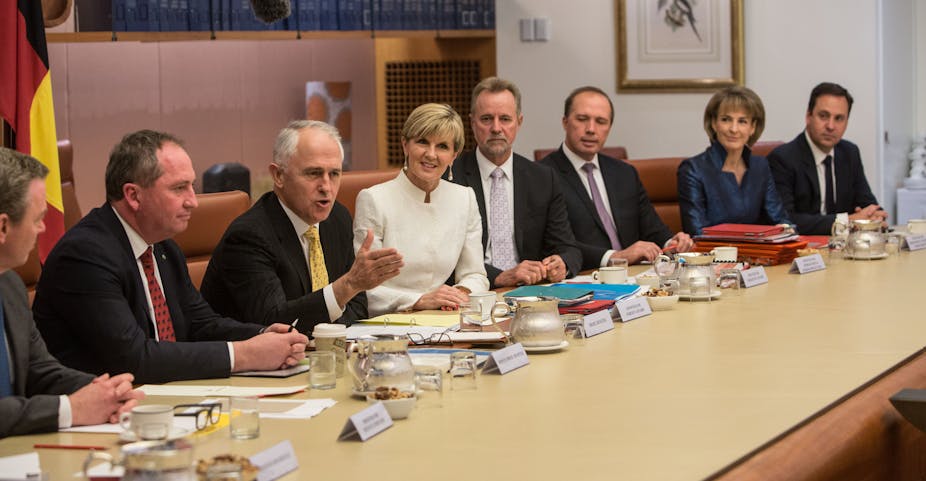Malcolm Turnbull has prevented Kevin Rudd from running to be secretary-general of the United Nations, declaring he is not suitable for the job.
After a divided cabinet on Thursday left Turnbull to make a “captain’s call” on the nomination, Turnbull telephoned Rudd on Friday morning to tell him of his decision.
Turnbull had been under enormous pressure from the Liberal right in particular, but also wider sections of the party, to block Rudd.
The decision is a major rebuff and embarrassment for Foreign Minister Julie Bishop, who had backed the nomination and carried the argument for it in cabinet, and a victory for Treasurer Scott Morrison and Immigration Minister Peter Dutton, who had gone public with their objections.
Turnbull declined to spell out why he considered Rudd, who served as prime minister and foreign minister, to be unsuitable, although he told Rudd.
At his news conference Turnbull said the fundamental threshold point was: “Does the government believe, do we believe, do I as prime minister believe that Mr Rudd is well suited for that role? My considered judgement is that he is not.
"Not everyone is well suited for every role. This is no disparagement of Mr Rudd. He is a former prime minister of Australia. But my judgement is that he is not well suited for this particular role.” He said the decision had “nothing at all” to do with Rudd’s Labor affiliations.
Asked whether Australia would support New Zealand’s candidate, former prime minister Helen Clark, Turnbull said the government would consider what position it took on other candidates.
Conservative Liberal senator Cory Bernardi issued a statement strongly praising Turnbull, saying the decision reflected “the sentiments of a great many Australians”.
“Our participation in international institutions is more important than an individual’s ambition. While seeking to advance Australia’s stature on the world stage, we’ve got to do what’s right, rather than what’s politically expedient. The prime minister had done exactly that today.”
Update
Malcolm Turnbull declined a request from Rudd for a Friday morning meeting, according to a statement Rudd issued late Friday.
Rudd flew to Sydney Friday morning, having sought a meeting on Thursday evening after it was announced cabinet had left Turnbull to make the decision about whether Australia should put his name forward as a candidate.
On Rudd’s arrival in Sydney Turnbull telephoned, indicating there was no opportunity for a meeting and he would not be nominating him.
Rudd thanked Bishop “and her many Cabinet colleagues for their consideration of and support for his candidacy”.
“It would have been the first time in the United Nation’s 70 year history that Australia offered a candidate for UN Secretary General.
"It would have reflected well on what our nation can offer to the world - as a middle power with relationships across the world, including the developing world, smaller states, the Commonwealth, our Pacific Island friends and of course our partners in Asia,” said the statement, which was issued in Rudd’s name but spoke of him in the third person.
Rudd noted that he had requested to be considered “as a former prime minister, a former foreign minister, a career diplomat, as someone who successfully campaigned for an Australian position on the UN Security Council in 2013-14, and who has chaired the Independent Commission on Multilateralism, a two year long review of the UN system against the core question of whether the UN remains fit for purpose.”
He pointed out that a nomination by the government would not have granted him a position. “It would simply have enabled him to stand alongside the 12 other candidates from across the world, and compete on his merits.
"That is now not to be.
"It is a pity the government has not seen fit to support him, as the Hawke Government supported Malcolm Fraser for the post of secretary-general of the Commonwealth, or the Howard Government supported Gareth Evans to be head of UNESCO,” the statement said.

